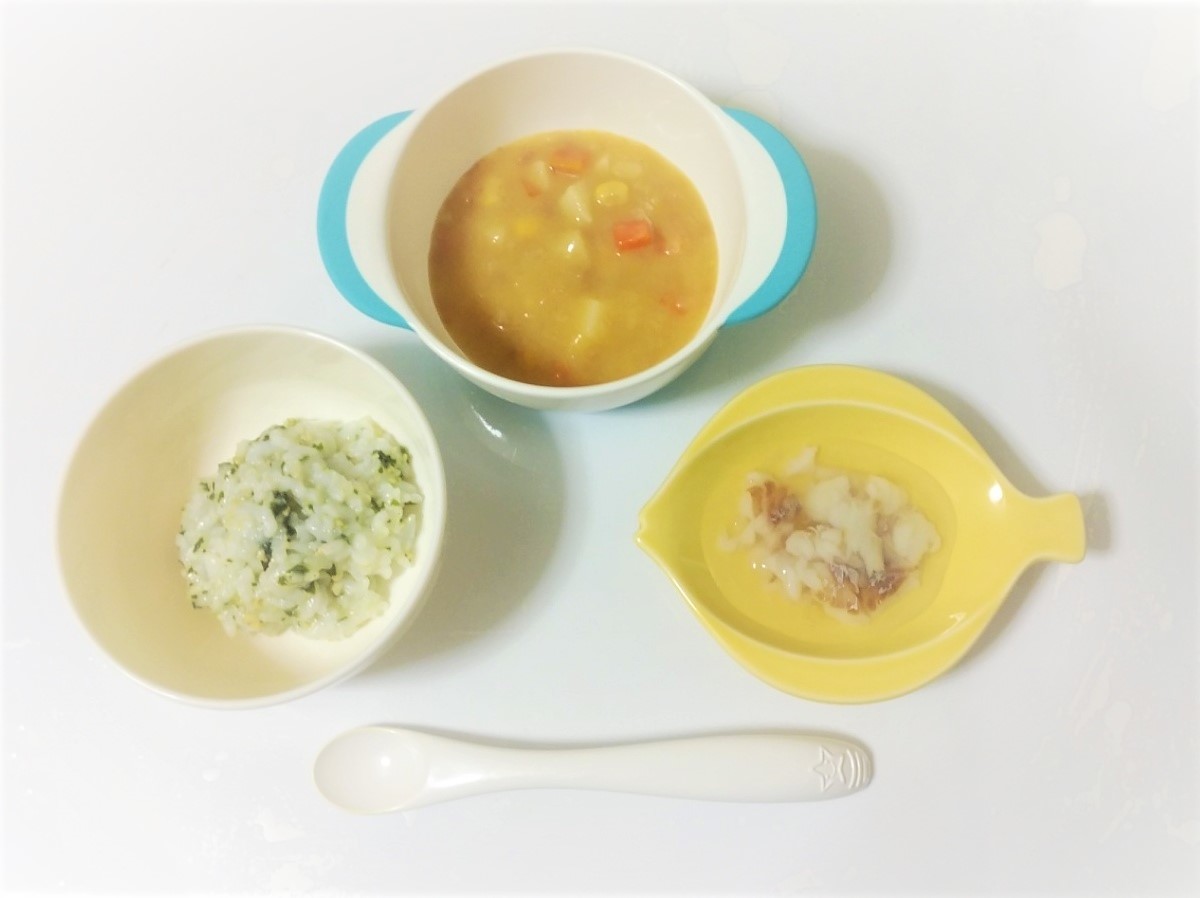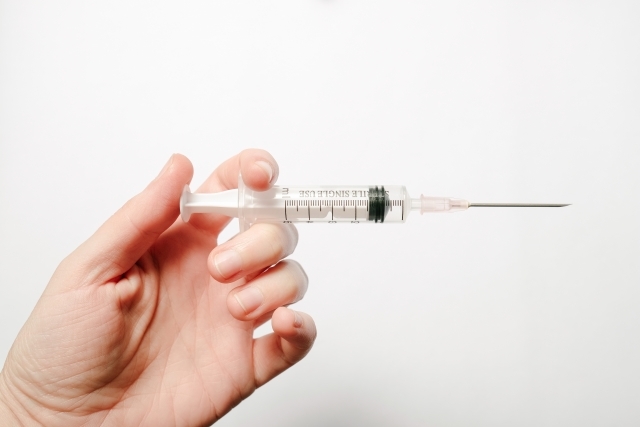My Child May Be Allergic To Food! A Blood Test Is Needed?
According to the Ministry of Health, Labor and Welfare, food allergy has started to increase from 15 years ago, and it is said that infants (0-1 year of age) develop the allergy the most. Speaking of infants, It’s an stage of life when baby food is given. Many mothers get worried if their child have the food allergy or not. There are also many parents who want their baby to get blood tests to see if they have allergy before starting weaning food.
In this article, the necessity of the blood test is explained especially when parents become concerned if their child has allergy.
Should My Child Take A Blood Test Before Starting Baby Food?
Many parents visit medical facilities to have their baby take a blood test so that they can make sure whether their baby has allergy before starting baby food.
Allergies including food allergies are generally diagnosed from “symptoms”. Without any symptoms, food allergies cannot be diagnosed. It is difficult to diagnose allergies only by blood test (※ 1, ※ 3). Blood test only indicates the possibility of the allergy.
Let’s suppose that the result of the blood allergy test showed a positive reaction towards specific foods. It does not necessarily mean that symptoms will appear if you eat or touch the food. In contrast, despite getting negative result toward the food in the examination, there are cases where allergy symptoms occur by eating or touching the food (* 3).
When the symptoms occur varies. They may appear when consuming a little amount of specified food. They might also suddenly occur when the baby is eating the food that they are used to eating. (* 1).
Even though the result of blood test reveals the patient’s constitution and possible allergens, it is difficult to predict whether food allergy symptoms occur or not. It is a common practice to diagnose food allergy based on the symptoms occur after consuming some food. It is unnecessary for the infant to take blood test before baby food starts.
There are a few instances where the baby gets blood test before weaning food.
A Case Where A Baby Gets A Blood Test Before Starting Baby Food
There are some cases where Dr recommend the test for a baby with atopic dermatitis who needs steroid ointment before starting baby food. This is because the baby has a predisposition to developing allergies based on the symptoms of skin inflammation.
A baby who has a predisposition to developing allergies tends to have a delicate reaction to food and the probability of developing food allergy also increases (※ 1, ※ 2). In such a case, through observation and skin control, an allergy specialist will make decision whether the examination is necessary. Parents are sometimes instructed to avoid certain food when they feed their baby if necessary.
As you can already understand, baby’s skin condition and food allergy are related (* 4). When infant develops rash, it is hard for parents to tell the cause (* 5). If the baby with skin rush started eating baby food, when allergic reaction occurs to certain food, it is hard to tell that the rush is a food allergy rash or else. If you are worried, you should consult with an allergist before giving your baby food.
When A baby Has Physical Reaction To A Specific Food
In general, when giving baby food for the first time, it is recommended to start giving each item small amount. There is a case where baby develop hives or skin redness when eating new food. Parents should take the baby to a hospital If the baby shows different physical reactions than usual.
There are a few important factors to be considered when the diagnosis is made. “When, under what kind of circumstance, what kind of symptoms developed after consuming what food ” (* 3). Since some symptoms such as hives may disappear immediately, it is ideal to take a picture with a smartphone. It is better to tell your Dr the following information During the medical examination (* 6).
◆ Good information to tell your doctor during an examination
- Food that is consumed (Notes and photos)
- Symptoms (when and how long the symptoms continued after eating)
- Environment (presence / absence of pet)
- Breast milk or artificial milk?
- Family member who are allergic
- Presence of other diseases
- Medicine being taken (Bringing a medicine notebook )
During the consultation, the doctor recommends the test if food allergy is highly suspected. The blood test has more than 100 items that need to be checked, but it doesn’t necessarily mean that all those items are checked. When the symptoms arise, it is necessary to narrow down the items base on the food consumed (* 3).
Method Of Diagnosing Food Allergy – Importance Of The Blood Test
Many people think of a blood test when diagnosing allergy. However, there are other tests other than “blood test (specific IgE antibody test)”. Those include “Oral food challenge test”, “Food removal test “, and “skin test (prick test)”. It is considered that oral food challenge test and food removal test are the main tests while blood test is an auxiliary test (* 7).
Oral food challenge test requires patient to eat some food to get a result. It is a stressful test for any infants who are experiencing baby food for the first time. There is a potentiality that the test even triggers anaphylaxis. For this reason, blood tests are sometimes chosen.
In the blood test, the amount of IgE antibody against the causative substance that lead to the allergic reaction is measured. IgE antibody is classified based on its amount from 0 to 6. 0 being negative, 1being false positive, and 2 to 6 are positive. Although it is an auxiliary test to diagnose the food allergy, it shows how likely the allergy symptoms occur based on the amount of IgE antibody and how high the class number is (* 7). As we reported earlier, even positive result is obtained from specific food, doesn’t necessary mean that your baby develop food allergy symptom after consuming the food 100%. Caution is necessary.
In addition to the results of the blood test, “probability curve” is used increasingly to see the probability of the symptom occurrence. The probability curve is a curve that indicates the extent of symptoms that might appear based on age (* 8). Diagnosis of food allergy requires multiple tools that allows a doctor to make a comprehensive judgment.
Self-Diagnosing Is Not Allowed, It Is The Doctor Who Evaluates The Examination Result
It is important not to self-diagnose. It is the doctor who evaluate the examination results and make diagnosis.
When a doctor diagnoses a food allergy, common practice used is to avoid certain causative food until a baby becomes more mature. (※ 1, ※ 2, ※ 6, ※ 7). It is better for parents to receive guidance on alternative foods. During the period when certain food is being removed, there are times when the baby cannot get enough necessary nutrients.
As the baby age, gastrointestinal function matures and the allergy number from the blood test often decreases. Oral food challenge test is carried out by a doctor who made the decision (※ 1, ※ 2, ※ 6, ※ 7). Oral food challenge test is also called an oral tolerance test. We will go into detail some another time.
Doctors and families cooperate to treat food allergies. The allergy does not last a lifetime. Food allergies that develop in infancy often cures as the baby age and grow. It is said that about 70% of children will be able to eat foods that caused allergic symptoms by the age of 3, and about 90% will be cured at the age of 9 (* 9).
The Notion Of Food Allergy Continues To Change
If you have family member who has allergy or if you are excessively worried about baby food, you tend to think inaccurately. For example, “Let’s remove any dangerous food from my baby’s diet “, “Let’s start giving milk and eggs as late as possible”. Infancy is an important period for the body to develop. As parents, you need to also pay attention to the balance of dietary nutrition. Don’t remove certain food from the diet based on only your judgement. If you are worried, please try to consult with your baby’s doctor first.
Research on food allergies is evolving everyday. In the past, ideas of “removing unnecessary food” or “delaying baby food as much as possible” were considered effective. In recent years, it is believed that start of baby food shouldn’t be delayed. (* 4, ※ 7). New facts such as close relation between atopic skin inflammation and food allergy and importance of skin care to prevent allergy are recognized.
As for the medical industry, allergic professional societies have been set up, and the number of allergic specialists have also increased. Rather than being sought up in old allergy information, please visit a medical institution if you are worried. Getting the doctor’s advice is useful.
Allergy tests such as blood tests are not perfect. It allows you to learn about the constitution and tendency of children and it will be possible to give consideration to foods and amounts used at home. Even if a child is diagnosed with food allergy, there is nothing to be pessimistic about. Let’s respond comprehensively while consulting with a doctor.
AlleHapi will continue to publish useful allergy information to readers.
Reference
※ 1: “Food allergies in children. Before starting baby food” Ueno pediatric clinic
https://www.ueno-kids-clinic.com/column/food02.html
※ 2: “Immunization and allergies part 5. Basic of weaning food” Kubo children Clinic
※ 3: “About Allergies of Children” Caps Clinic (Medical Corporation Nize)
https://www.caps-clinic.jp/allergy
※ 4: “Child’s Food Allergy New Measures” NHK Health ch
https://www.nhk.or.jp/kenko/atc_357.html
※ 5: “Skin care · Skin rash of infants” Yoko Children’s clinic
http://yoko-kodomo.jp/skincare.html
※ 6: “Food Allergy· Oral Desensitization Therapy” Medical Corporation Genki-kai Ayumi Clinic
http://www.ayumi-clinic.com/allergy_food.htm
※ 7: “Child’s Allergy and food allergies” Ariake children’s clinic
https://child-clinic.or.jp/Allergy_food
※ 8: “Probability curve for safer oral food challenge test” Phadia company
http://www.phadia.com/Global/Market%20Companies/Japan/Image/allergy/ALLAZiN/ALLAZiN_2009_SpringLiv
※ 9: What is food allergy? Ueno’s pediatric clinic
https://www.ueno-kids-clinic.com/column/food.html
※ 10: “Food allergy” Ministry of Health, Labor and Welfare
http://www.mhlw.go.jp/new-info/kobetu/kenkou/ryumachi/dl/jouhou01-08.pdf


